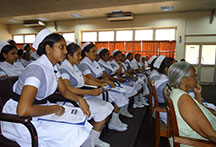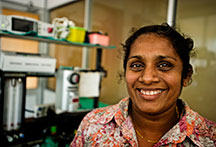Copyright @ 2015-2026 | c-spoc.org
All Rights Reserved.
Number of people? 40,000 patients annually; over 1000 staff
Ahmad Tea

Sustainability governs all of our capacity building projects.
For us, ensuring continuity of use and service is especially important for major hospital projects, aimed at improving care services for their local population.
Our model of working not only applies to individuals, but to organisations and communities. Through our development project at a major cancer hospital in Sri Lanka, we have shown that investments in the education of employees, improvements to the working environment, and the support of enterprising new initiatives can create lasting sustainable solutions.
Our program in Sri Lanka focuses on education, health and enterprise to sustain a high quality hospital environment and a wealth of resources, whilst promoting a sense of citizenship for all those involved in tackling the impact of cancer in Sri Lanka.

Hospital acquired infection was a big issue for the medical facility. To solve the problem, we introduced a hospital quality secretariat and implemented the “5S” technique to remove waste from the work environment through a hygiene management system. These initiatives have considerably reduced rates of infection acquired on-site.
The hospital had no proper way to dispose of biological waste, creating a dangerous hazard to the health of staff, patients and visitors. We helped the hospital become a national leader in proper waste management through working with national and international partnerships to commission a centralised incinerator and improve waste management.
We focused on creating a healthy living environment for the patients. To that effect, a new seven storey medical complex is in construction, which will reduce the serious overcrowding and replace old delipidated buildings. Among the facilities, there will be new laboratories, a surgical complex, a chemotherapy day centre and pharmacies.

In order to help nurses become educated on the important aspects of oncology care, we facilitated an oncology nurse training program. This course not only covered radiotherapy, chemotherapy and palliative care, but also provided learning to the trainers themselves.

Another aim was to train all employees on the processes they need to maintain exceptional care. To that end, we have also implemented an ongoing quality assurance training program..
Managing patient data is a huge part of running a hospital efficiently. We partnered with enterprising health informatic consultants and developers from local universities to create custom-built software for patient record keeping. This novel approach will now act as a blueprint for hospitals all over the country.
The cancer hospital is home to some 800 patients at any given time. Many will remain for months or even longer, forming bonds of friendship with other patients and staff. It is in this togetherness that the hospital community thrives. And with the collective efforts to improve quality of care, there is a renewed sense of rapport at the hospital.
Our hospital development programs are planned with long term objectives in mind. For the cancer hospital, we use a sector wide approach, partnering with the local Ministry of Health as well as private sector philanthropists from an international tea business, Ahmad Tea. By drawing upon local knowledge, working closely with key stakeholders, and empowering individuals, we have shown that a community-led approach to development produces better results.